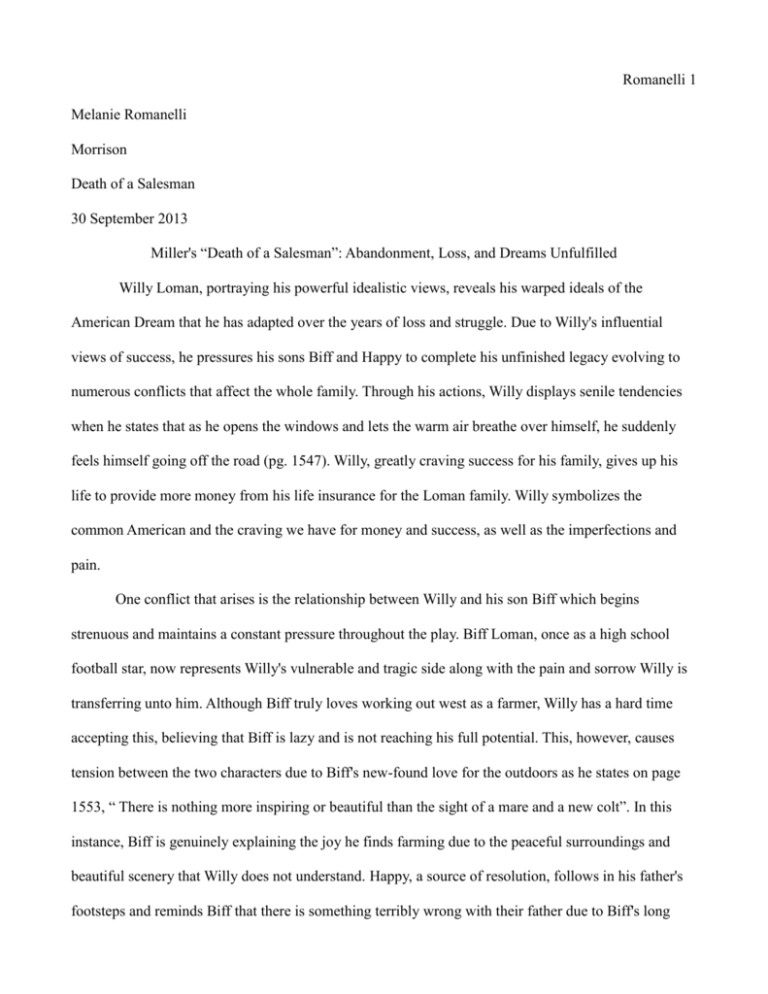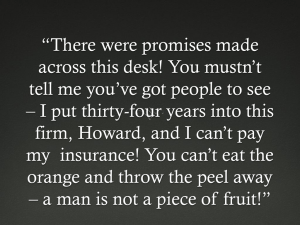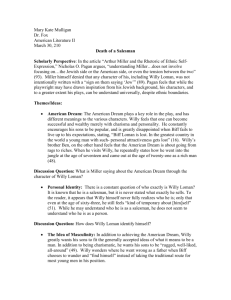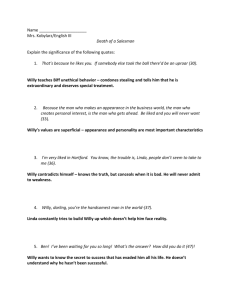File - Melanie romanelli
advertisement

Romanelli 1 Melanie Romanelli Morrison Death of a Salesman 30 September 2013 Miller's “Death of a Salesman”: Abandonment, Loss, and Dreams Unfulfilled Willy Loman, portraying his powerful idealistic views, reveals his warped ideals of the American Dream that he has adapted over the years of loss and struggle. Due to Willy's influential views of success, he pressures his sons Biff and Happy to complete his unfinished legacy evolving to numerous conflicts that affect the whole family. Through his actions, Willy displays senile tendencies when he states that as he opens the windows and lets the warm air breathe over himself, he suddenly feels himself going off the road (pg. 1547). Willy, greatly craving success for his family, gives up his life to provide more money from his life insurance for the Loman family. Willy symbolizes the common American and the craving we have for money and success, as well as the imperfections and pain. One conflict that arises is the relationship between Willy and his son Biff which begins strenuous and maintains a constant pressure throughout the play. Biff Loman, once as a high school football star, now represents Willy's vulnerable and tragic side along with the pain and sorrow Willy is transferring unto him. Although Biff truly loves working out west as a farmer, Willy has a hard time accepting this, believing that Biff is lazy and is not reaching his full potential. This, however, causes tension between the two characters due to Biff's new-found love for the outdoors as he states on page 1553, “ There is nothing more inspiring or beautiful than the sight of a mare and a new colt”. In this instance, Biff is genuinely explaining the joy he finds farming due to the peaceful surroundings and beautiful scenery that Willy does not understand. Happy, a source of resolution, follows in his father's footsteps and reminds Biff that there is something terribly wrong with their father due to Biff's long Romanelli 2 periods of departure. With Happy's additional comments of business, sex, and girls, Willy's influence is clearly dominant in Happy's life especially when Happy refers back to a specific time in high school when, “ There were crowds of girls behind Biff every time the classes would change” (pg. 1559). Happy having a superficial way of viewing the world makes it more clear that he is unable to selfanalyze or think for himself. Another conflict that is clearly shown within the play is the idea of abandonment and how it has affected Willy. Ben Loman, a successful man and the older brother of Willy Loman, was left a lone with Willy when their dad abandoned them at a young age. Ben later leaves to Alaska grieving Willy due to the lack of companionship that is now present in his life. Once Ben is dead and absent completely from Willy's life, Ben leaves Willy developing a warped version of the American Dream with no one to turn to. Ben also symbolizes the success and power Willy craves for himself and his sons, but never is really in reach. For example, Willy imagines and speaks to Ben in his head when he has anxiety about Biff, Happy, or the families income. Linda Loman, wife of Willy Loman, is a loyal wife who represents reason throughout the unstable and chaotic household of the Lomans. Although Linda has some internal conflict, she remains peaceful and maintains order. Linda trying to reason with Willy, Biff, and Happy questions, “Why must everybody conquer the world” (Pg. 1594)? Linda, in this instance is the common sense in the midst of the competitive and aggressive behavior. Linda does not like that everyone around her is always at odds and compete for the highest available opportunity even if it means straining the relationship with the ones that are closest to you. Although Biff and Happy tend to only see the bad traits in Willy, Linda reassures them that Willy cares about their well- being, but has a hard time showing it. Throughout all the chaos and disorganization, Linda's unconditional love for Willy shows more drastically as the play proceeds; especially when Linda convinces Biff and Happy that they should make peace with Willy after one argument by saying, “Please, dear. Just say good night. It takes so little to make him happy. Romanelli 3 Come” (Pg. 1582). Linda, in this instance, is the resolution to Biff and Willy's conflicts by reasoning as well as pleading. The final, and most apparent conflict that Willy Loman undergoes is completely internal. Willy, having an overly self-involved mind, is constantly mixing the past from the present and fantasies from reality. With this constant back and forth motion of the play, Miller takes the idea of the audience observing the play and begins to transform it into the audience experiencing the play themselves as if they were really at the Loman's house. An example of this smooth transition from Willy's mind to reality is shown in the conflict at the restaurant when Biff is trying to tell his dad that he didn't make a deal with Oliver; however, Willy transports to an old conversation with Biff and has a hard time deciphering which conversation is real. Due to the confusion Willy undergoes for the remainder of the time, he soon generates long periods of mental escape. Willy then decides to end his life as the final resolution to the conflict he believes is most affecting their family, which is money. Falling into depression and being misunderstood by others is another conflict Willy overcomes by death. In addition to breaking free from the chains that this world has put upon him, there is finally an equilibrium between Willy's fantasies and reality that has been absent from his life prior to his death. In the last description of the play before the requiem, Miller describes that, “ As the car speeds off, the music crashes down in a frenzy of sound, which becomes the soft pulsation of a single cello string...At the limit of the apron, Linda lays down the flowers, kneels, and sits back on her heels. All stare down at the grave” (pg. 1628).







